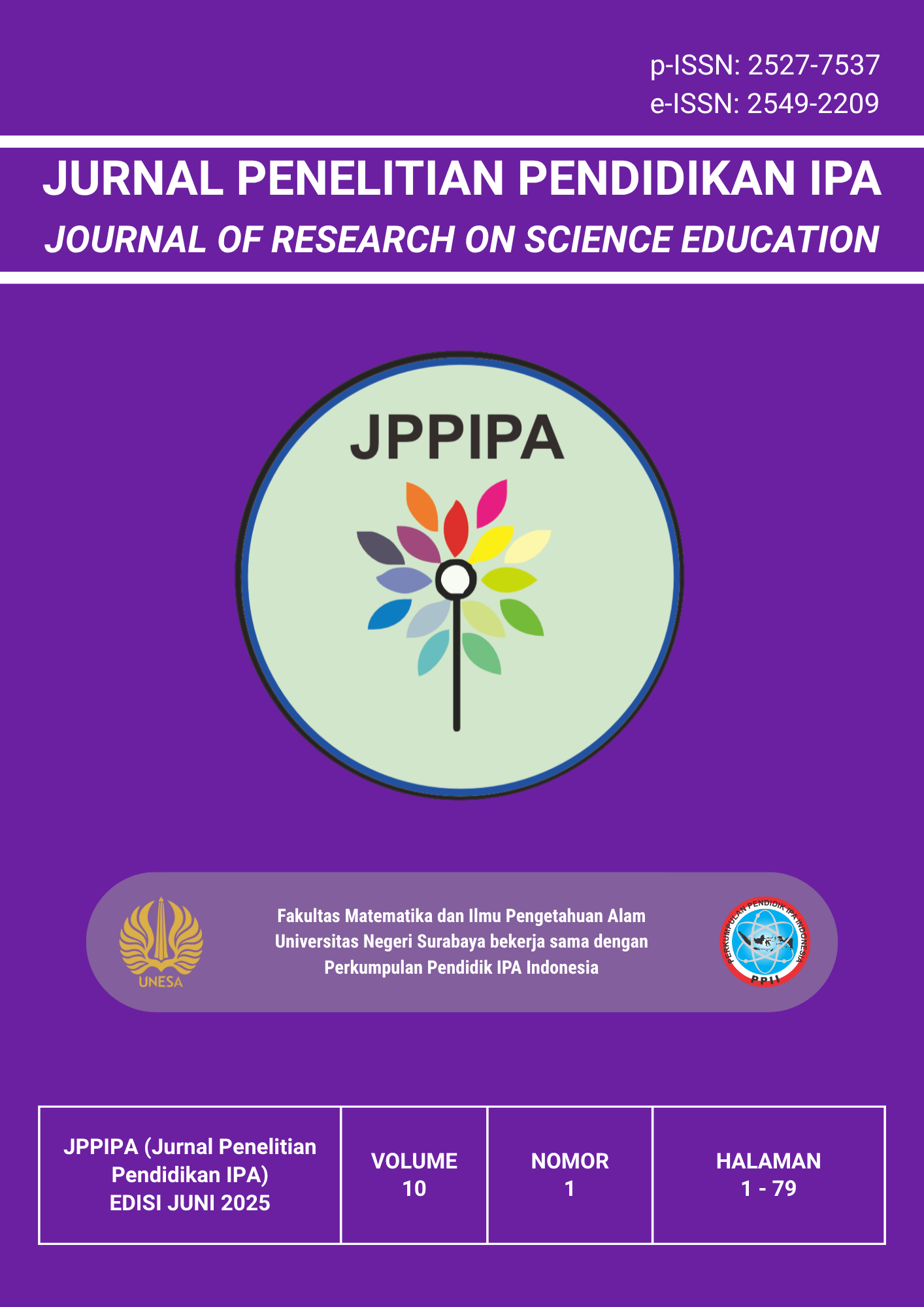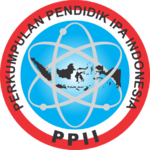DEVELOPMENT OF AN ELECTRONIC MODULE BASED ON PBL-STEM IN A CONTEXTUAL ETHNOSCIENCE LEARNING “RED BRICK MAKING” TO IMPROVE STUDENTS’ PROBLEM-SOLVING SKILLS
DOI:
https://doi.org/10.26740/jppipa.v10n1.p28-36Keywords:
Electronic Module, Ethnoscience, PBL, Problem Solving Skills, STEMAbstract
This research aims to: (1) produce an electronic science modules based on PBL-STEM in ethnoscience learning “red brick making” that are feasible to improve problem solving skills; (2) determine the practicality of electronic science modules based on PBL-STEM in ethnoscience learning “red brick making” “ has been produced in improving problem solving skills; (3) determine the effectiveness of electronic science modules based on PBL-STEM in ethnoscience learning “red brick making” has been produced in improving problem solving skills. This research is development research by adapting Thiagarajan’s 4-D model consisting of Define, Develop, Design, and Disseminate. This research involved 2 expert lecturers as validators, as well as 30 seventh-grade students of SMP N 3 Banguntapan as research subjects. The data analysis technique used qualitative and quantitative analysis. The effectiveness of LKPD through prerequisite test, paired sample t-test, and effect size test. The results showed that: (1) there has been produced electronic modules based on PBL-STEM on ethnoscience learning “red brick making” is very feasible to use in science learning; (2) electronic modules based on PBL-STEM on ethnoscience learning “red brick making” has been produced is very practical in improving students’ problem solving skills (3) electronic modules based on PBL-STEM on ethnoscience learning “red brick making” has been produce is very effective in improving students’ problem solving skills.
References
Asri, A., & Dwiningsih, K. (2022). Validitas e-modul interaktif sebagai media pembelajaran untuk melatih kecerdasan visual spasial pada materi ikatan kovalen. PENDIPA Journal of Science Education, 6(2), 465–473. https://doi.org/10.33369/pendipa.6.2.465-473.
Cohen, L., Manion, L., & Morrison, K. (2018). Research methods in education (8th edition). New York: Routledge.
Daryanto., Dwicahyono, A. (2014). Pengembangan perangkat pembelajaran (Silabus, RPP, PHB, Bahan Ajar). Yogyakarta: Penerbit Gava Media.
Gilad, B., & Loeb, P. D. (1983). A systematic approach to problem solving. Journal of Business Education, 58(6), 263-265. https://doi.org/10.1080/00219444.1983.10534906.
Husein, U. (2010). Metode penelitian untuk meningkatkan motivasi belajar siswa (Edisi 11). Jakarta: Raja Grafindo Persada.
Kamila, K., Ahied, M., Hadi, W. P., Putera, D. B. R. A., & Sutarja, M. C. (2024). Development of ethnoscience-based integrated science e-modules using flipbooks on the theme of rebon shrimp paste. JPPIPA (Jurnal Penelitian Pendidikan IPA), 9(1), 16–28. https://doi.org/10.26740/jppipa.v9n1.p16-28
Kautsari, M., Hairida, H., Masriani, M., Rasmawan, R., & Ulfah, M. (2022). Pengembangan e-modul berbasis problem based learning pada materi zat adiktif. EDUKATIF : Jurnal Ilmu Pendidikan, 4(6), 8116–8130. https://doi.org/10.31004/edukatif.v4i6.3850
Khoiri, A., & Sunarno, W. (2018). Pendekatan etnosains dalam tinjauan fisafat. Spektra : Jurnal Kajian Pendidikan Sains, 4(2), 145. https://doi.org/10.32699/spektra.v4i2.55.
Kuntojojo. (2009). Metode penelitian. Kediri: Universitas Nusantara PGRI.
Lestari, H. N., Suganda, O., & Widiantie, R. (2017). Hubungan antara pengetahuan metakognitif dengan kemampuan pemecahan masalah melalui model problem based learning (PBL) pada konsep pencemaran lingkungan di kelas X. Quagga: Jurnal Pendidikan dan Biologi, 9(2), 23-31. doi:10.25134/quagga.v9i02.745.
Mullis, I. V. S., Martin, M. O., Foy, P., & Hooper, M. (2020). TIMSS 2019 international results in science. TIMSS & PIRLS International Study Center.
Nugraha, A., & Zanthy, L. S. (2018). Analisis kemampuan pemecahan masalah siswa SMA pada materi sistem persamaan linear. Journal On Education, 1(2), 179-187. doi:https://doi.org/10.31004/joe.v1i2.45
Nurhasnah, N., Azhar, M., Yohandri, Y., & Arsih, F. (2022). ETNO-STEM dalam pembelajaran IPA: a systematic literature review. Kwangsan: Jurnal Teknologi Pendidikan, 10(2), 147-163. doi:10.31800/jtp.kw.v10n2.p147-163.
OECD. (2020). Future of education and skills 2030: curriculum analysis. https://www.oecd.org/education/2030-project/
OECD. (2023). PISA 2022 results (Volume I): what students know and can do. OECD Publishing.
Purwaningsih, E., Sari, A. M., Yuliati, L., Masjkur, K., Kurniawan, B. R., & Zahir, M. A. (2020). Improving the problem-solving skills through the development of teaching materials with STEM-PjBL (science, technology, engineering, and mathematics-project based learning) model integrated with TPACK (technological pedagogical content knowledge). Journal of Physics: Conference Series. 1481. 012133. https://doi.org/10.1088/1742-6596/1481/1/012133.
Rusman, K., Kurniawan, D., & Riyana, C. (2013). Pembelajaran berbasis teknologi informasi dan komunikasi. Jakarta: Rajawali Pers.
Setiawan, A., Degeng, I. N. S., Sa’dijah, C., & Praherdhiono, H. (2020). The effect of collaborative problem-solving strategies and cognitive style on students’ problem-solving abilities. Journal for the Education of Gifted Young Scientists, 8(4), 1618–1630. https://doi.org/10.17478/jegys.812781
Sudarmin. (2014). Pendidikan karakter, etnosains dan kearifan lokal (pertama ed.). Semarang: Fakultas Matematika dan Ilmu Pengetahuan Alam Universitas Negeri Semarang.
Sudarmin, Pujiastuti, R. S. E., Asyhar, R., Prasetya, A. T., Diliarosta, S., & Ariyatun. (2023). Chemistry project-based learning for secondary metabolite course with Ethno-STEM approach to improve students’ conservation and entrepreneurial character in the 21st century. Journal of Technology and Science Education, 13(1), 393–409. https://doi.org/10.3926/jotse.1792
Thiagarajan, S., Semmel, D. S., & Semmel, M. I. (1974). Instructional Development for Training Teachers of Exceptional Children. Minnesota: University of Minnesota.
Viana, A. O., Alfatira, D. N., & Hadiningsih, H. R. (2023). Studi literatur: efektivitas model PBL pendekatan STEM terhadap kemampuan pemecahan masalah matematika peserta didik. Prosandika Unikal (Prosiding Seminar Nasional Pendidikan Matematika Universitas Pekalongan), 4(1), 221–228.
Downloads
Published
How to Cite
Issue
Section
 Abstract views: 413
,
Abstract views: 413
, PDF Downloads: 205
PDF Downloads: 205












